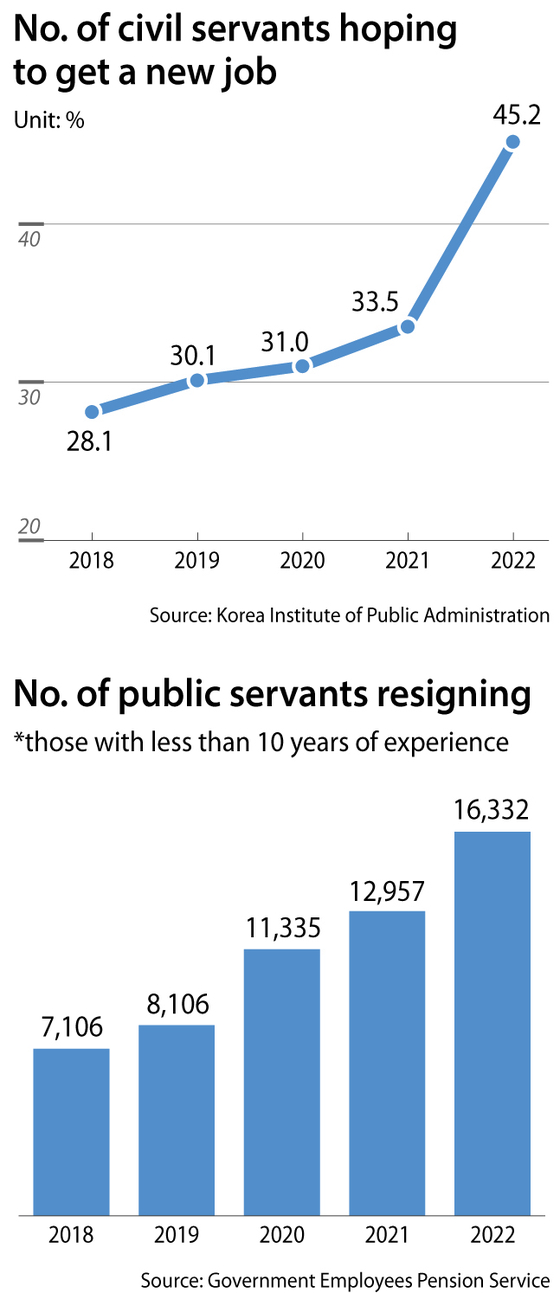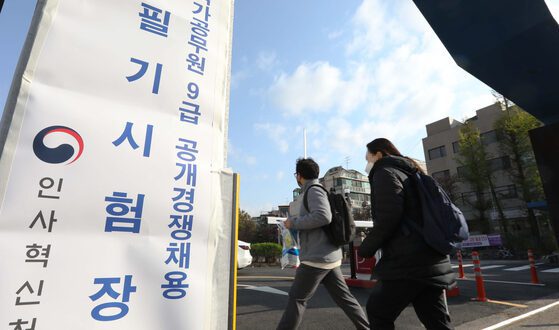![More young public servants resign due to pay, culture. 2 People taking the grade 9 civil servant examination head to a school in Seocho District, southern Seoul to take the examination on April 8. [NEWS1]](https://minduncharted.com/wp-content/uploads/2023/06/ec588a4d-a765-46ee-8d0f-5b329fc1945a.jpg)
People taking the grade 9 civil servant examination head to a school in Seocho District, southern Seoul to take the examination on April 8. [NEWS1]
Many young public servants leaving due to low compensation and unfriendly work culture
Being a civil servant was once considered a “dream job” in Korea. However, increasing numbers of young public servants are quitting their jobs due to low compensation and an unfriendly work culture. Members of the so-called Generation MZ working in public institutions often cite low pay and slow promotions as reasons for leaving. A 29-year-old grade 9 civil servant working at the Korea Customs Service decided to quit after a four-year tenure due to slow promotions and a monthly compensation of 1.8 million won ($1,390).

According to the Government Employees Pension Service, there has been a significant increase in the number of public servants between the ages of 20s and 40s quitting their jobs. The number rose from 6,039 in 2018 to 11,693 in 2022. The main reason for civil servants leaving their jobs is their extremely low salaries. The monthly pay for grade 9 public servants starts from 1.77 million won, which is even lower than the minimum monthly compensation of 2.01 million won. A survey by the Ministry of Personnel Management showed that last year, the compensation level for civil servants compared to private company employees stood at 83.1 percent, the lowest since the survey began in 2000.
Unsatisfactory work culture and other contributing factors
Civil servants are no longer satisfied with the stability and sense of duty provided by their role, alongside the low salary. The working culture in public institutions is often inflexible, and incidents of bullying tend to be covered up within the organization. Employees tend not to help colleagues dealing with such incidents, leading to isolation and mental health issues. These reasons have resulted in many civil servants taking their own lives. According to Democratic Party Rep. Choi Hye-young’s office, 49 public servants took their own lives last year. Local governments are now implementing measures to prevent the exodus of young civil servants, such as offering counseling sessions and investigating bullying within the organization.
Revamping the organization and job responsibilities
While some local governments are introducing measures to address the issue, many argue that what civil servants need is a revamp of the organization itself. The structure that places excessive responsibility on young civil servants in the lower tiers should be amended. Jobs and responsibilities should be readjusted to ensure that those in higher grades deal with complaints instead of burdening those in lower positions. This, along with improvements to the hierarchical and closed working culture, can help retain young civil servants.
BY OH YOO-JIN, CHO JUNG-WOO [cho.jungwoo1@joongang.co.kr]
 Mind Uncharted Explore. Discover. Learn.
Mind Uncharted Explore. Discover. Learn.



